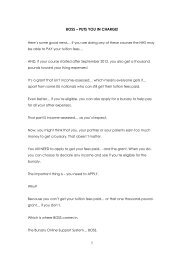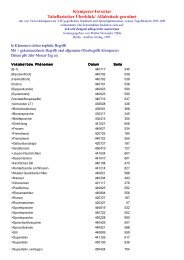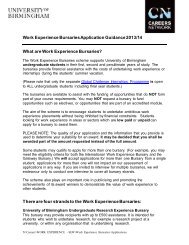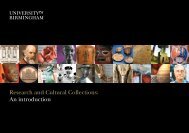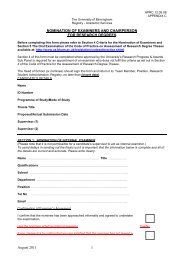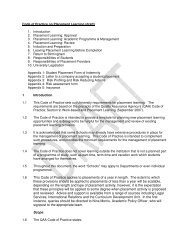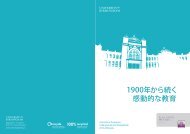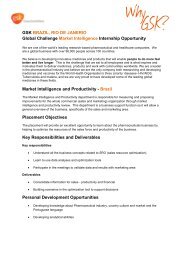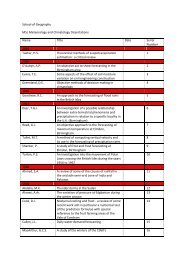American and Canadian Studies Year Abroad Information
American and Canadian Studies Year Abroad Information
American and Canadian Studies Year Abroad Information
You also want an ePaper? Increase the reach of your titles
YUMPU automatically turns print PDFs into web optimized ePapers that Google loves.
Revised Sept 2013UNIVERSITY OF BIRMINGHAMAMERICAN & CANADIAN STUDIESYEAR ABROAD PROGRAMME2013-14Schedule of the Application ProcessCHOOSINGCAMPUS CHOICECOSTSHOUSINGEMPLOYMENTAPPLYINGAPPLICATION FORMSPRE DEPARTURE TASKSVISAHEALTH INSURANCEHOUSINGCOURSE PRE-REGISTRATIONMONEYPRE-DEPARTURE MEETINGTASKS WHEN ABROADCHECK-INEMAIL ACSCOURSE REGISTRATIONBANKINGINDEPENDENT STUDYDISSERTATION PREPARATIONWELFARECOURSE CHOICES FOR YEAR 4CULTURAL DIFFERENCESWelcome to the Department of <strong>American</strong> <strong>and</strong> <strong>Canadian</strong> <strong>Studies</strong>’ <strong>Year</strong> <strong>Abroad</strong> homepage. This siteis dedicated to providing up-to-date information about our department’s year abroad programmes in theUnited States <strong>and</strong> Canada. This site is part of a series of resources formulated to guide studentsthrough their preparations for <strong>and</strong> experiences during <strong>and</strong> after their year in America or Canada. Thesite functions in conjunction with official literature from participating universities <strong>and</strong> formal/informalinformation sessions held throughout the year by ACS.Settling on a host institution for the year abroad is a complex process. Concerns such as cost, location,courses offered <strong>and</strong> student life are major factors in the decision-making process. These pages aredesigned to provide as much information as possible to make this decision slightly less complicated.Please note, however, that the information contained here can change rapidly. Please double checkwith the <strong>Year</strong> <strong>Abroad</strong> Tutor to make sure it is accurate.Please note that the work you do during your year abroad does count towards your degree. Youwill enroll on <strong>and</strong> take some modules <strong>and</strong> complete an independent study. Further details ofthese requirements follow. Let us say immediately, however, that successfully completing <strong>and</strong>passing the modules <strong>and</strong> the independent study is crucial. Any failures create progression
problems which can impede the progress of your studies in your final year – the most importantin all of your studies. Failing your year abroad will jeopardize your degree.Schedule of the Application ProcessMid/late OctoberNovemberDecemberInitial Orientation meeting for second year students: with ACS staff, final yearstudents <strong>and</strong> US/Canada exchange students.Students make ranked choices using form provided by ACS. If one location isover-subscribed then decisions will made on basis of academic merit (year 1marks in core ACS courses).ACS makes initial allocations then passes them to the International Office atUoB who will make final call on allocation of places.JanuaryJan/February/MarchApril/May/JuneApril/May/June/JulyMay or JuneJune into early JulyAugust/SeptemberInternational Office confirm allocation of places to ACS studentsApplications arrive in International Office during this periodStudents are informed by email from IO; collect, complete <strong>and</strong> return theirapplication by deadline given by IO, seeking assistance from both IO <strong>and</strong> ACS<strong>Year</strong> <strong>Abroad</strong> Tutor where needed. A MANDATORY International Officeorientation will occur before the Easter vacation.Students notified of acceptance at N <strong>American</strong> university <strong>and</strong> receive formalacceptance packs at various dates during this period.After acceptance, students should begin visa application process immediately.Students register online for courses at N <strong>American</strong> university – after gettingapproval for choices from the ACS <strong>Year</strong> <strong>Abroad</strong> tutorFinal m<strong>and</strong>atory pre-departure meeting with ACS staffStudents going to USA: interviews for visa at US EmbassyStudents going to Canada: obtain visa application from <strong>Canadian</strong> HighCommissionArrive at your new university begin classesCHOOSINGCAMPUS CHOICEBACKThe <strong>American</strong> <strong>and</strong> <strong>Canadian</strong> <strong>Studies</strong> Department currently operates exchange programs with a numberof US <strong>and</strong> <strong>Canadian</strong> universities. In 2010-2011, ACS students were studying at 15 different universitiesin North America. The following list provides a description of each host university, including size,location <strong>and</strong> a brief portrait of student life. This list also contains links to the website for each hostinstitution. In most cases, these websites serve as the best potential source of information <strong>and</strong> westrongly encourage students to take the time to browse through them. Students are not guaranteed aplace at any particular university. The number of places available to ACS students at each campuswill be confirmed by the International Office at the University of Birmingham in late October ofeach year. ACS has no control over the number of places that are available at each institution.UNITED STATES*University of Wyoming-Laramie: The main university in the state of Wyoming, which has thesmallest state population while being the third largest geographically. Laramie, Wyoming, a town of
approximately 25,000 residents is located 45 miles west of Cheyenne at an elevation of 7,200 feet.www.wyoming.eduUniversity of Iowa: The University of Iowa is a major national research university located on a 1,900-acre campus in Iowa City in southeast Iowa, on the Iowa River near the intersection of U.S. InterstateHighways 80 <strong>and</strong> 380. Iowa is composed of 11 colleges, the largest of which is the College of LiberalArts <strong>and</strong> Sciences, enrolling most of Iowa's undergraduates. www.uiowa.eduUniversity of Wisconsin-Milwaukee: This research <strong>and</strong> teaching at the UWM ranges wide <strong>and</strong> far,extending to 148 different degree programs that serve nearly 26,000 students. Receiving an educationin the state's largest metropolitan area gives students access to the hundreds of companies-many ofwhich the university works with regularly-that call southeastern Wisconsin home. www.uwm.eduUniversity of Virginia: Founded by Thomas Jefferson in 1819, The University of Virginia, based inCharlottesville, Virginia, was named #2 among public universities, according to the 2005 U.S. News &World Report. Since U.S. News began ranking public colleges <strong>and</strong> universities in 1998, U.Va. hasnever been lower than No. 2. www.virginia.eduUniversity of Mississippi: Total enrollment on The University of Mississippi’s three campuses <strong>and</strong>The University of Mississippi Medical Center is almost 16,500. Sixty-seven percent of undergraduatesare from Mississippi, <strong>and</strong> 18 percent of all students are minorities. International students come from 66nations. The main campus is in Oxford, Mississippi. The university was founded in 1848.www.olemiss.eduUniversity of Alabama: Located in Tuscaloosa, the University of Alabama is a major, comprehensive,student-centered research university founded in 1831 as Alabama’s first public college. The Universityof Alabama is ranked among the top 50 public universities in the nation for the sixth consecutive yearin U.S. News <strong>and</strong> World Report’s annual college rankings, fall 2006. www.ua.eduBerry College: Located in Mount Berry, Georgia, Berry College is an independent, coeducationalcollege with fully accredited arts, sciences <strong>and</strong> professional programs plus specialized graduateprograms in education <strong>and</strong> business administration. The college is recognized as one of the outst<strong>and</strong>ingcomprehensive colleges in the South. www.berry.eduBirmingham-Southern College: Birmingham-Southern College is a four-year, private liberal artsinstitution founded in 1856. It is located in Birmingham, Alabama on 192 wooded acres three mileswest of downtown Birmingham. www.bsc.eduUniversity of Cincinnati: Founded in 1819 <strong>and</strong> located in Cincinnati, Ohio, this 20,000-studentuniversity offers a wide range of undergraduate courses. www.uc.eduUniversity of Minnesota-Duluth: Situated in the city of Duluth <strong>and</strong> part of the well-regarded, largeregional U of Minnesota which has links with other university <strong>and</strong> cultural institutions in the TwinCities, UMD has 11,664 students, of whom about 9,500 are undergraduates. UMD's campus consists ofmore than 50 buildings on 244 acres overlooking Lake Superior, all built since 1948. In US terms,UMD is a mid-sized campus university. http://www.d.umn.edu/University of Connecticut: Founded in 1881, this large state university is located in Storrs,Connecticut. www.uconn.eduUniversity of Kansas http://www.kansas.edu/Rutgers University http://www.rutgers.edu/University of Pittsburgh http://www.pitt.eduNew Mexico State University http://www.nmsu.eduNorth Texas University http://www.unt.edu/Loyola University- New Orleans http://www.loyno.edu/
University of Wisconsin-Milwaukee http://www4.uwm.edu/Bellarmine University http://www.bellarmine.edu/University of Illinois-Chicago http://www.uic.edu/uic/Illinois Institute of Technology http://www.iit.edu/CANADA*McGill University: is an English-speaking university situated in downtown Montreal, a functionallybilingual multicultural city of 3.4 million people. The total student population at McGill is about30,000. With an all-round excellent academic reputation, McGill's strengths include History, English,<strong>Canadian</strong> <strong>Studies</strong>, <strong>American</strong> <strong>Studies</strong>, ethnic studies. www.mcgill.ca;www.mcgill.ca/StuServ/iss/int1stud.htm (information for International Students)**University of Toronto (U of T): an impressive campus which mixes nineteenth-century collegebuildings with modern architectural styles, U of T is in downtown Toronto, Canada's largest city.Undergraduate student enrolment on the downtown campus is about 20,000. U of T has the fourth largestlibrary in North America <strong>and</strong> academic strengths include English, History, Cinema <strong>and</strong> Communication<strong>Studies</strong>, International Relations, US & <strong>Canadian</strong> <strong>Studies</strong>. www.utoronto.ca; www.library.utoronto.ca/isc(International Student Centre)The University of Ottawa: Known as "Canada's University ©," the University of Ottawa wasfounded in 1848 <strong>and</strong> is Canada's largest bilingual university with large numbers of internationalstudents. It offers a wide range of courses suitable to ACS students that can be taken in either French orEnglish (exchange students are not required to be able to speak French). The university is centrallylocated in Ottawa, only a fifteen-minute walk from Parliament Hill, Canada's centre of government,<strong>and</strong> is connected to Ottawa's excellent bus system. Ottawa as Canada's national capital offers a widerange of activities to its citizens. Some of these include boating, cycling, roller blading, skiing, <strong>and</strong>skating, the latter on the world's longest outdoor skating rink, the Rideau Canal. It is a centre for majorconcerts at the National Arts Centre <strong>and</strong> is home of the Ottawa Senators, a team in the National HockeyLeague. Ottawa is across the Ottawa River from the province of Quebec <strong>and</strong> is only two hours by busor train from Montreal <strong>and</strong> four hours by bus or train from Toronto. Its airport offers direct flights tothe U.K. <strong>and</strong> various cities in the U.S. http://www.uottawa.ca/welcome.htmlDalhousie University: Founded in 1818, Dalhousie University has a strong academic reputation. Theuniversity offers a wide variety of courses to its diverse body of students, including many drawn fromabroad. Its attractive campus is located in the city of Halifax, for centuries a major British naval port<strong>and</strong> the capital of the province of Nova Scotia. The British-built citadel still dominates the Halifaxskyline. Today, Halifax has become a cultural centre for all of Atlantic Canada <strong>and</strong> is well known forits live entertainment, bars, <strong>and</strong> low cost of living. Its main airport offers direct flights to the U.K., toMontreal <strong>and</strong> Toronto, <strong>and</strong> to cities in the United States. http://www.dal.ca/Simon Fraser University: Located on top of a mountain in Burnaby, British Columbia, a suburb ofVancouver, SFU opened in 1965, it was known in the 1960s as Canada’s most “far out” universitybecause of its radical politics <strong>and</strong> protests. It is now a large <strong>Canadian</strong> university offering a wide varietyof courses that connect to both the United States <strong>and</strong> Canada. www.sfu.caUniversity of British Columbia: (UBC) is located in Vancouver, Canada's third largest city, which issurrounded on three sides by the ocean <strong>and</strong> overlooked by mountains. UBC's large modern campus is30 minutes from downtown Vancouver on its own parkl<strong>and</strong>, complete with forest trails, <strong>and</strong> is 10minutes from the beach. Undergraduate enrolment is 29,000. Academic strengths include English,History, Women's <strong>Studies</strong>, Native <strong>Studies</strong>, Anthropology, Asian <strong>Studies</strong>. www.ubc.ca.www.international.ubc.ca (information for International Students).Trent University: Located in Peterborough, Ontario, a small city an hour away from Toronto, Trent isa small university that conducts all of its undergraduate classes as small seminars. It also has a strong<strong>Canadian</strong> <strong>Studies</strong> program. www.trenu.ca
University of New Brunswick (UNB)Located on two campuses in New Brunswick – Saint John (the biggest city in the province) <strong>and</strong>Fredericton (the provincial capital), UNB was founded in 1785. Students will usually be based at oneof the two campuses. A small university with an intimate <strong>and</strong> friendly feel, UNB is well-known for itsnurturing of writers, its historic locations, <strong>and</strong> the quality of its undergraduate teaching. Find out moreat:http://www.unb.ca/dynamicuniversity/index.html [general UNB site]http://www.unbf.ca/prospective/ [Fredericton]http://www.unbsj.ca/prospective/ [Saint John]University of Waterloo http://uwaterloo.ca/University of Guelph http://www.uoguelph.ca/Western University http://www.uwo.ca/University of Saskatchewan http://www.usask.ca/* any university partner may not be available in a particular yearCOSTSUPDATED SEPTEMBER 2013VERY APPROXIMATE COSTS 2011/12 - not including travel costs to <strong>and</strong> from N AmericaU.S.CanadaHousing $450 - $750 pcm off Depends on locationcampus, from $350on campusFood/MealPlan$30- $60 week; mealplan from $250 perquarterGroceries similar costto UK. Eating out ishalf the price or less.Books $300 - $800 $Cdn 400-800Health Varies from $Cdn700 for yearuniversity to (varies from provinceuniversity-Mississippi healthto province but youwill need to pay forcare is $400 for the health insurance)academic yearTransport Very variable VariableOverall, typical costs for U.S. campuses were between $12000 <strong>and</strong> $16000 for the academic year 2011-2012 <strong>and</strong> between $10,000 <strong>and</strong> $14,000 (Cdn.) in Canada.Students applying to universities in the U.S. have to show that they have the approximate amounts in thefollowing table to cover their expenses during their stay. These figures are not ACTUAL costs <strong>and</strong> mayhave increased but expect that you will need to show that at a minimum there is $20,000 U.S. in a familyaccount.The figure for the remainder of the U.S. universities will be confirmed by the International Office.All amounts are subject to change. It is advised that you allow for a 7% margin of increase in these figures whenmaking your financial arrangements.BACK
HOUSINGThe type <strong>and</strong> cost of accommodation will be a major factor influencing your choice of university.Accommodation options vary from university to university. You may prefer to live off-campus in private,rented accommodation with <strong>American</strong> or <strong>Canadian</strong> students.Some on-campus housing is available at some universities but is usually not guaranteed. University housingoptions cover a wide range: Single bedroom in dormitory-style building; catered Shared room in dormitory-style building; catered or self-catered Single bedroom in a flat; catered or self-cateredSome universities offer specialty houses, such as an International house or an Alternative Lifestyles house.Check with your host university to see what housing options are available. Pay close attention to housingapplication procedures <strong>and</strong> deadlines. University websites are extremely valuable for up to date informationregarding housing options <strong>and</strong> requirements.University accommodation has its advantages <strong>and</strong> its disadvantages. It can be cheaper, <strong>and</strong> on some campusesit's much more convenient to be housed on site. But as in Britain, most first-year students live in universityaccommodations. Although as an exchange student you would most likely have the option of living indormitories reserved for older students, you may be placed with younger students (ages 17-19). Some studentsdiscover from living with first years that the year between first <strong>and</strong> third year is a crucial one in terms ofmaturity. If you feel this may be the case, then take proper steps to ensure you are not placed in first-yearaccommodations. Most universities should be willing to house you with similar age students. At UBC housingis in self-catered flats. Opt for those located centrally on campus, i.e. Gage or Fairview.In addition, some university housing schemes require residents to participate in a meal plan. While catered hallsin the US or Canada generally cater to greater variety than British university catering facilities by offeringvegetarian <strong>and</strong> vegan options, their high price for value may seem a bit restrictive. Check with your housingofficers about meal options <strong>and</strong> ensure that you get the best value for your accommodation money. If you feelfollowing a strict meal schedule may be too constrained or living with first-year students might be toofrustrating, looking outside the university for accommodations is always an option.Check with Birmingham students currently in North America to see if they can pass theiraccommodation on to you. Bear in mind transportation costs <strong>and</strong> possible difficulties such as suitable publictransportation, distance <strong>and</strong> travel time when researching living options. That said, many of our students havesuccessfully <strong>and</strong> affordably lived off-campus <strong>and</strong> have benefited greatly both culturally <strong>and</strong> socially fromsharing private rented accommodation with <strong>Canadian</strong> or <strong>American</strong> students.BACKEMPLOYMENTSome Birmingham students obtain part-time employment while abroad. Generally, under the guidelines forstudent visas, British students in the US or Canada can work up to twenty hours per academic week <strong>and</strong> up toforty hours on school holidays. But bear in mind that you will need a US social security number. Theapplication process for this has become lengthy, <strong>and</strong> could delay the start of employment by several weeks.You can only work on-campus, but on-campus opportunities are readily available at most of the exchange sites.Most universities have an on-campus job recruitment centre or a bulletin board with job postings. Working is agood opportunity to earn extra cash <strong>and</strong> to meet other students. It is illegal to work off-campus unless you arean <strong>American</strong> or <strong>Canadian</strong> citizen. Doing so risks deportation.
BACKAPPLYINGAPPLICATION FORMSCourse ChoiceYou will need to register for four courses per semester. In term one three of these four courses should be theequivalent of an upper division course (in other words, a third or fourth year module) <strong>and</strong> must in some waypertain to ‘North <strong>American</strong> studies’ (more detail provided below). At many universities course codes that are inthe 300s or 400s indicate such classes. One of the four classes can be at a lower level <strong>and</strong> outside of the realm ofNorth America. Such a choice could include, for example, a prerequisite course to allow you to take a moresenior module.In term two you should be again taking four modules but one of these four must be an independent studymodule. The same rules in terms of modules described in the previous paragraph apply.The following is a fictional example of a proper selection of courses:-------------------------------------------Nith River State UniversityTerm OneCourse 321 The Writings of Jack Kerouac, Course 440 <strong>American</strong>-<strong>Canadian</strong> Relations, Course 389 A History ofBaseball, Course 200 Chinese-Japanese RelationsTerm TwoCourse 340 The Writings of Margaret Atwood, Course 406 A History of Saskatchewan, Course 180Introduction to Art History, Course 499- Independent Study-----------------------------------------Students must take four courses per semester [4 in semester 1; 3 plus independent study in semester 2]:Further important points about course choices:most courses must pertain to the culture <strong>and</strong> civilization of the Americas (United States, Canada, LatinAmerica or the Caribbean). Comparative subjects (e.g. Modern Photography, exploring artists in Engl<strong>and</strong>,France <strong>and</strong> the U.S.) are acceptable, provided that a substantial part of the course concerns the Americas.The LEA <strong>and</strong> the University of Birmingham must be assured that study abroad is an essential <strong>and</strong> integralelement of the degree course;if you are a JH ACS/English or JH ACS/History student, then half of your chosen courses must pertain tothe non-ACS half of your degree. These should still be upper level courses; <strong>and</strong> you must still pass them toproceed. It is your responsibility to check with your parent dept. whether or not they have anyspecial requirements for you to follow or complete during your year abroad.courses must be taken for a grade <strong>and</strong> for credits, <strong>and</strong> not just for Pass/Fail (except for IS in the lastsemester or winter <strong>and</strong> spring quarters);courses must be advanced level (Upper Division or Graduate), (300 level in Canada) unless there areprerequisites which involve technical expertise (e.g. essential knowledge in music or anthropology in order
to take courses in Native <strong>American</strong> <strong>Studies</strong> or the <strong>American</strong> Musical). In this case, Lower Division courses(200 level or exceptionally 100 level in Canada) are acceptable, if permission is sought in advance;independent study – all students (SH <strong>and</strong> JH) must take IS in the second term/semester [or 2 nd <strong>and</strong> 3 rdquarters]. You should register for this so that it appears on your transcript – it may have a different name atyour host institution. You must take it for credits <strong>and</strong> you need to pass it (the grade will not be counted aspart of your year 3 mark, but you MUST do <strong>and</strong> pass IS to complete year 3 <strong>and</strong> progress to year 4). Weneed it to be on your transcript so that we have proof that you did it. A letter/email from your supervisor isfurther evidence. Ask for help at the International Office of your host campus if you have problems. InNovember you should start looking for a supervisor – this is your responsibility. The document ‘BasicGuidance for Independent Study’ available as a download at:http://www.uscanada.bham.ac.uk/exchange.htm is a helpful item.one course per quarter/semester may be taken on non-<strong>American</strong> topics provided permission is obtained inadvance. Normally this course should be at least a 2 nd year module or above unless the student can make anexplicit case to the year abroad tutor as to why a first-year module should be taken.You are encouraged to take courses which are seldom taught in the UK: North <strong>American</strong> subject matter in thefollowing disciplines <strong>and</strong> fields are examples: art history, material culture, archaeology, anthropology, minoritystudies, environmental studies, architectural history, folklore, music <strong>and</strong> performance studies.It is YOUR responsibility to ENSURE that you have registered for sufficient credits <strong>and</strong> forupper level courses in ACS-approved subject areas. You should always get approval for yourfinal course choices for each semester or quarter from the ACS year abroad tutor via e-mail.Failure to register for sufficient amounts of credits, failure to register for, undertake <strong>and</strong> passIndependent Study <strong>and</strong> failing courses will all have SERIOUS CONSEQUENCES for yourdegree studies.YOU MUST PASS YOUR YEAR ABROAD CLASSES AND INDEPENDENT STUDYIN ORDER TO GET YOUR DEGREE. You must maintain a GPA of at least 2.67 atUS universities, <strong>and</strong> a minimum of a C/D average in Canada in order to beawarded 120 credits for the year.Please note that the work you do during your year abroad does count towards your degree. Youwill enrol on <strong>and</strong> take some modules <strong>and</strong> complete an independent study. Successfullycompleting <strong>and</strong> passing the modules <strong>and</strong> the independent study is crucial. Any failures createprogression problems which can impede the progress of your studies in your final year, <strong>and</strong>indeed, even jeopardize your final degree.UniversitySemester orQuarterSystemNew Mexico State 2 semesters 4 courses per semesterU of Minnesota- 2 semesters 4 courses per semesterDuluthU of Alabama 2 semesters 4 courses per semesterRutgers 2 semesters 4 courses per semesterPittsburgh 2 semesters 4 courses per semesterBellarmine 2 semesters 4 courses per semesterU of Illinois- 2 semesters 4 courses per semesterChicagoIllinois Institute of 2 semesters 4 courses per semesterTechnologyU of Cincinnati 2 semesters 4 courses per semesterCourses <strong>and</strong> Credits total per semester or quarter required byUoB (nb in second semester [or 2 nd & 3 rd quarters] you mustregister for <strong>and</strong> be supervised for independent study)
SFU 2 semesters 4 courses per semesterKansas 2 semesters 4 courses per semesterNew Brunswick 2 semesters 4 courses per semesterTrent 2 semesters 4 courses per semesterU of Toronto 2 semesters 4 courses per semesterSaskatchewan 2 semesters 4 courses per semesterWestern 2 semesters 4 courses per semesterWaterloo 2 semesters 4 courses per semesterGuelph 2 semesters 4 courses per semesterDalhousie 2 semesters 4 courses per semesterPitzer 2 semesters 4 courses per semesterIowa 2 semesters 4 courses per semesterWyoming 2 semesters 4 courses per semesterBerry 2 semesters 4 courses per semesterNorth Texas 2 semesters 4 courses per semesterBirmingham 2 semesters 4 courses per semesterSouthernWisconsin- 2 semesters 4 courses per semesterMilwaukeeLoyola University-New Orleans2 semesters 4 courses per semesterUniversitySemester orQuarter SystemCourses <strong>and</strong> Credits total per semester or quarter required byUoB (nb in second semester [or 2 nd & 3 rd quarters] you mustregister for <strong>and</strong> be supervised for independent study)4 courses per term: 4 credits=16 unitsPitzer College,California2 terms (Fall <strong>and</strong>Spring)U of Wyoming 2 semesters (Fall 4 courses per semester& Spring)U of Iowa 2 semesters 4 courses; 12 credits=12-15 semester hours per semesterU of Wisconsin- 2 semesters 4 courses per semester (12 credits)MilwaukeeU of Mississippi 2 semesters 4 courses per semesterU of Virginia 2 semesters 4 courses per semester (12 credits)U of Minnesota- 2 semesters 4 courses per semesterDuluthU of Alabama 2 semesters 4 courses per semesterU of Connecticut 2 semesters 4 courses per semesterU of Illinois @ 2 semesters (Fall 4 courses= 12 credit hours per semesterUrbana-Champaign <strong>and</strong> Spring)Berry College 2 semesters (Fall 4 courses per semester<strong>and</strong> Spring)Birmingham 3 terms (Fall, 4 courses per termSouthern College Interim <strong>and</strong>U of CincinnatiSpring)3 quarters(Autumn, Winter,Spring)first quarter: 4 courses [4 x 4 credits = 16; or, 3 x 4 credits + 1 x 3credits = 15 ]second quarter: 4 courses [ditto]third quarter: 3 courses plus independent studyU of Toronto 2 semesters 4 courses per semester = 4 credits per yearMcGill 2 semesters 4 courses =12 credits per semesterU of Ottawa 2 semesters 4 courses per semesterDalhousie2 semesters 4 courses per semesterUniversityUBC 2 semesters 4 courses per semesterSFU 2 semesters 4 courses per semester
Trent 2 semesters 4 courses per semesterUniversity SchedulesClasses at <strong>Canadian</strong> universities begin the first Tuesday after the Labour Day holiday which occurs on the firstMonday in September. Classes at some U.S. universities begin in mid to late August while others start in earlySeptember after the Labor Day holiday. Exam sessions occur in December <strong>and</strong> classes resume in January. Classesat <strong>Canadian</strong> universities end in early April <strong>and</strong> the remainder of April is for exams. Some U.S. universities follow asimilar pattern while others have classes that extend into May followed by exams.PERSONAL STATEMENTThis is part of some application forms although the length-requirement varies considerable from university touniversity. While it is not crucial, it is nevertheless a useful way of organizing <strong>and</strong> clarifying your futureacademic plans <strong>and</strong> demonstrating to your potential host that you area motivated <strong>and</strong> enthusiastic student. Youshould emphasise your academic goals <strong>and</strong> how these relate to university choice <strong>and</strong> your career ambitions.Focus on how the courses, specialisms <strong>and</strong> departments of your chosen campus fit with your desired study path.If there are areas outside <strong>American</strong> or <strong>Canadian</strong> <strong>Studies</strong> at a particular campus that you are especially interestedin, you might mention these as well, e.g. an extra-curricular activity such as student journalism or a sport youwish to continue to pursue.The style is important: express yourself briefly, clearly, <strong>and</strong> assertively. There is a tendency for British studentsto understate their achievements. If possible, type, or at least write legibly with a black pen so it can bephotocopied. The <strong>Year</strong> <strong>Abroad</strong> Tutor will be glad to discuss the statement with you.OTHER APPLICATION MATERIALSYou MAY also need:- a letter of recommendation from ACS (e.g. from personal or academic tutor)-photocopies of your A Level certificates.- a transcript of courses with examination results taken in the first year, <strong>and</strong> courses being taken in thesecond year (obtainable from ACS)FINANCIAL ISSUESIf you are applying to universities in the U.S., you will probably need to provide documentation with yourapplication that demonstrates that you can cover the estimated costs of living <strong>and</strong> studying there. Your applicationmaterials will specify the amount if this is the case, <strong>and</strong> will most likely suggest forms of documentation which willprovide evidence, but keep reading for some suggestions.For locations which do not require this at the point of application, proof of financial support does not need to besubmitted until you are applying for your US or <strong>Canadian</strong> Visa. US or <strong>Canadian</strong> citizens will not need to providethis documentation.Before a campus may send the form (I-20 or DS-2019) allowing you to apply to the Embassy of the United Statesfor a visa (F-1 or J-1), it must be certain that you have adequate means to support yourself for the nine months ofacademic study. For this reason, it is ESSENTIAL that you supply FULL <strong>and</strong> SPECIFIC information.You must provide documented evidence of having access to at least the amount specified for the "estimated livingexpenses" for your campus. Every source of financial support must be proven with an official document whichspecifies a figure.
Potential Sources of Financial Support:LEA Grants: If you are in receipt of a grant from your local authority, it is payable for study abroad. Some LEAswill give grants to supplement your living expenses on the grounds that costs are higher abroad. You should checkwith your Authority, since each one seems to have a different list of expensive places. Similarly, some will pay allor part of your airfare to <strong>and</strong> from your exchange university, <strong>and</strong> for a trip home over the winter vacation. Youshould obtain a letter from the LEA stating the amount of any grant that it is prepared to pay.Parental/sponsor contribution: If parent(s) or sponsor(s) are funding you in whole or in part, they need to provideevidence of this - for example, in the form of a bank statement showing the amount available for your support Thismay require some juggling of monies: the point is to have document(s) showing that the total amount available addsup to the estimated living costs as provided by the campuses of your choice.Student Loan: All students should be eligible for a loan. Although you will apply for the loan in the September ofyour year abroad, you should include a form letter from the University's Finance Office setting out the amount <strong>and</strong>term of the loan with your financial documentation.Personal Funds: Provide evidence of any savings or income that you intend to use to support yourself.TuitionNB: As an exchange student, you do not pay tuition fees to your exchange institution but rather 15% of your normaltuition to the University of Birmingham.BACK
PRE DEPARTURE TASKSVISAS – ARE *YOUR* RESPONSIBILITY!ALL STUDENTS: You are advised not to buy your plane ticket before you obtain your student visa. Atthe very least, do not buy non-refundable travel tickets before obtaining your student visa.It is also possible that you may not receive your visa (<strong>and</strong> have your passport returned) until mid-late summer,therefore you are strongly advised not to plan any overseas travel for the summer of 2011 in advance ofreceiving your student visa for your study year abroad.ACS Staff cannot accept responsibility for the accuracy of the following information regarding visas <strong>and</strong> the processof visa application since US regulations change almost annually. It is the responsibility of students to checkcarefully through the information sent by their host institution (<strong>and</strong> on their host institution’s International Officeweb pages) <strong>and</strong> on the US Embassy website, OR on the <strong>Canadian</strong> High Commission website to ensure that theybook a visa interview well in advance of departure, <strong>and</strong> that they obtain all necessary documentation required fortheir visa applications <strong>and</strong> visa application interview. Please note that both the US <strong>and</strong> the <strong>Canadian</strong> governmentcharge a fee for the visa.APPLYING FOR US VISAAll these details are available on the US embassy website www.usembassy.org.ukAPPLYING FOR A CANADIAN VISA (‘Study Permit’)You need to apply for a ‘study permit.’ As of September 2013 the fee was Can$125 (approximately £80).This can be done through the post or electronically. Check out the current information on the <strong>Canadian</strong> HighCommission in London's website: it is clear <strong>and</strong> helpful <strong>and</strong> you can download the application kit (variousforms <strong>and</strong> instructions) <strong>and</strong> a useful checklist for the study permit.http://www.canadainternational.gc.ca/united_kingdom-royaume_uni/visas/study-etude.aspxThe High Commission quotes 7 weeks as the average time that it takes to process your application.ENSURE THAT YOUR APPLICATION IS COMPLETE BEFORE YOU SUBMIT IT TO THE HIGHCOMMISSION IN LONDON. Incomplete applications are subject to delays.Helpful hints:- MCGILL STUDENTS ONLY: you need to apply for <strong>and</strong> obtain a Certificat d'acceptation du QuebecAND a Canada study permit. The letter of acceptance from McGill will include information <strong>and</strong>application form for the Quebec visa: do it as soon as you receive the forms <strong>and</strong> make sure that youhave completed it in full (get someone sensible to check it over) before you send it off. A properlycompleted application will ensure that they process it quickly. In the past it has been necessary toobtain the Certificat before the <strong>Canadian</strong> study permit. ALL STUDENTS GOING TO CANADA As a UK citizen you do NOT usually need to have amedical exam, nor do you require a temporary resident visa. You DO need your letter of acceptance from the <strong>Canadian</strong> university before you can send off yourcompleted application for a study permit, <strong>and</strong> 'proof that you have enough money to live near school' (nb as an exchange student the 'pay schoolfees' part is irrelevant). Bank statements, letter from parent/guardian who pays you maintenance,student loan company letter <strong>and</strong> LEA grant letters where applicable should be adequate, but theinstructions for the ‘study permit’ should be read carefully. START gathering these materials beforeyou receive your acceptance letter. Ms Conway can supply you with a letter stating that you are returning to complete your studies here inBirmingham -- but you need to go <strong>and</strong> ask her for it (don't leave this until the last minute <strong>and</strong> rememberthat she is extremely busy in the first two weeks of June). When you arrive in Canada, the immigration officers at the airport will usually take you aside to anoffice, <strong>and</strong> will want to see your visa letter <strong>and</strong> proof of acceptance to study at a <strong>Canadian</strong> university,so keep these documents to h<strong>and</strong>. It is also advisable to have your proof of financial support letters toh<strong>and</strong> as well. Immigration will stamp your passport -- this is your study permit. Smile, be polite <strong>and</strong>don't get stroppy even if you're jetlagged!
BACK
HEALTH INSURANCEUS CAMPUSESAll students going to US campuses will be required to purchase health insurance from their host institution. Thecost varies according to the campus but is usually $800 to $1000. Go to individual university websites toresearch the details of these policies <strong>and</strong> what they cover. Remember they will not cover you in transit or‘hospitalization’, so you will also need a years travel insurance, purchased before you leave the UK.CANADAAs an international student you may be required to purchase health insurance. Cost varies from province toprovince from approximately Cdn $500 to $900. It will cover you for full healthcare in your 'home' province<strong>and</strong> entitles you to some form of medical care in other parts of Canada. In British Columbia insurancepurchased from provincial government is m<strong>and</strong>atory. Students going there should read the advice on the medicalservice plan carefully since you may require additional insurance for the first three months of your residence.(Go to: www.international.ubc.ca)It may be possible to pay in advance of your arrival but if you do so you will have to obtain a foreign draft inCdn$ (add about £20 to cost). Check with the International Student Exchange Office at your host campus byconsulting their web pages for International Students.At McGill students are billed by the university very early in the semester. The bill can be paid at a bank or atthe Finance Office. You can get a refund if you obtain work on campus. You will need a letter confirming youremployment which you should take to the International Office. They will give you forms to fill in <strong>and</strong> yourrefund (by cheque) has to be collected from the Finance OfficePay at the earliest opportunity. Late payment may incur a hefty fee <strong>and</strong> you are not covered for medicaltreatment until you have paid.TRAVELWhen making travel arrangements, bear in mind that if you are expecting to find accommodation on arrival youshould arrive at least 10 days, preferably 2 weeks, before the start of term to give yourself time to findsomewhere to live. If your LEA is paying part or all of your airfare, check before you purchase your ticket tosee if there are restrictions on the type of fare they will cover. An open return will give you the most flexibility,but usually costs more than non-refundable discounted fares.MONEYRemember that the first few weeks away will be the most expensive (accommodation costs, health insurance,books, travel cards etc). A UK credit card (Visa or Mastercard) will be very helpful but you will need to makearrangements for the payment of bills mailed to your UK address. Travellers' cheques are a safe way ofensuring initial cashflow.BACKPRE-DEPARTURE MEETINGWill be held in May or June. This meeting will cover both practical queries <strong>and</strong> academic expectations for theyear abroad, including independent study <strong>and</strong> dissertation preparation.BACK
BACKTASKS WHEN ABROADCHECK-INMake yourself known to the campus International Office as a priority. Staffed by friendly, knowledgeableindividuals they offer an invaluable source of support, information <strong>and</strong> advice. In some cases (e.g. U of T) theyare the folk who enable you to register for courses.EMAIL ACSSend us your email <strong>and</strong> snail address as soon as possible. Failure to do this will mean we will use the emailaddress supplied to you by the University of Birmingham (your bham address).COURSE REGISTRATIONBACKMake sure you've registered for courses.BACKBANKINGMost British students in the US or Canada open a checking account. Depending on the bank, this type ofaccount generally comes with a check (cheque) book <strong>and</strong> an ATM card. Most retailers will not accept checkswithout a driver’s license, but the ATM card can be used as a debit (Switch/Delta) card. US banks charge high<strong>and</strong> frequent transaction fees. For example, most banks charge monthly fees. Should you make any transactionswithin that month, the bank will often charge an additional transaction fee. Withdrawing money from a cashpoint owned by another bank will often result in a charge from your bank <strong>and</strong> from the bank that owns the cashpoint. Finally, overdrafts do not exist in the US. Overdrawing your account, even by cents, can result in heavyfinancial penalties. It is important to check out all your options before settling on a bank. Be up front abouttransaction fees <strong>and</strong> interest rates <strong>and</strong> do not be afraid to ask for the least expensive account.BACKINDEPENDENT STUDYUS – All single honours <strong>and</strong> joint honours students must register for two quarters or one semester ofIndependent Study. The formal process begins at the end of the Fall quarter/semester when you register for thenext set of courses, but you should begin to sound out likely supervisors before this. Independent study willbe graded on a pass/fail basis only. For more details on what is required, <strong>and</strong> why, go to the ACS website - 2 nd& 3 rd year courses: Basic Guide for Independent Study is at the end of the course list.http://www.uscanada.bham.ac.uk/exchange.htmCANADA: You must register for one semester of Independent Study (Sem 2) NB You may have to do this atthe beginning of the year rather than mid-way. By mid-November you should be sounding out possiblesupervisors. (see above).BACK
DISSERTATION PREPARATIONYou will need to produce a short synopsis of your intended dissertation topic by the middle of January. Thismust then be emailed to the year abroad tutor or to the ACS General Office staff (as advised). A draft title of thedissertation, in addition to the written work produced during independent study, must be supplied to the sameaddress by April. For further details see Guidelines to Independent Study <strong>and</strong> Dissertation Guidelines, to befound on the ACS website under 2 nd <strong>and</strong> 3 rd years courses.WELFAREBACKThe international office at your host university is there to help you should problems arise. Please contact theACS Department immediately if you need help at: yearabroadtutor@contacts.bham.ac.uk.BACKCOURSE CHOICES FOR YEAR 4Margaret Conway will contact you about your course choices after Easter. <strong>Information</strong> on each module isaccessible via the ACS webpages. If you have specific questions email the appropriate course tutor. Pleaseadhere to the deadlines outlined by Ms Conway. BACK
Please note that the work you do during your year abroad does count towards your degree: forboth JH <strong>and</strong> SH students on four year programmes it is worth 12.5% of your final degree. Youwill enroll on <strong>and</strong> take some modules <strong>and</strong> an independent study. Further details of theserequirements follow. Let us say immediately, however, that successfully completing <strong>and</strong> passingthe modules <strong>and</strong> the independent study is crucial. Any failures create progression problemswhich can impede the progress of your studies in your final year – the most important in all ofyour studies.CONVERSION SCALESIn line with all British Universities <strong>and</strong> with the approval of the external examiners, we apply a scale to convertthe grade awarded in each of the modules you studied to a percentage.US CONVERSION SCALE80797877767574 A737271706968 A-676665646362 B+616059585756 B5453525150 B-494847464544 C+4342 C4140 C-39 <strong>and</strong> below: FAIL. Ie, a grade D+ or lower
CANADIAN GRADE CONVERSION80797877 A7675747372 A-7170696867 B+6665646362 B6160595857 B-5654535251 C+50494847 C464544 C-4342 D+41 D40 D-39 <strong>and</strong> below: FAIL. Ie, a grade E+ or lowerHaving applied this scale <strong>and</strong> taking account of module weightings (some modules are credited more heavilythan others) we arrive at one percentage mark for the year. Remember that the IS mark is a pass/fail mark <strong>and</strong> isnot included in this percentage mark. This is because the work will count towards your dissertation mark inyour final year.IMPORTANT NOTE ABOUT RESITS FOR YEAR 3 AND MITIGATIONSPLEASE TRY HARD NOT TO FAIL OUT ON ANY MODULES!! If you fail a module in the firstsemester or quarter, please inform the <strong>Year</strong> <strong>Abroad</strong> Tutor asap! If you experience any health or seriousproblems affecting your academic performance, please contact the ACS Welfare Tutor <strong>and</strong> <strong>Year</strong> <strong>Abroad</strong>Tutor at the earliest opportunity, <strong>and</strong> collect evidence so that we can support your case for mitigations ifnecessary.Here is the detail on resits (which has been formally approved by the University of Birmingham):-<strong>Information</strong> about grades, pass/fails etc is collected from students electronically by the ACSAdministrative staff in liaison with the ACS tutor in as timely fashion as possible duringDecember/January <strong>and</strong> again in April/May/June of the Study <strong>Year</strong> <strong>Abroad</strong>, so that the need for anyresits can be determined <strong>and</strong> resit work set during the final weeks of term 3.
The ACS Exams Officer is responsible for ensuring that resits are set, marked <strong>and</strong> returned to theappropriate Exam Boards.In order to pass the year abroad students must gain a minimum mark of C- in US or D- in the<strong>Canadian</strong> systems (which are equivalent to a UoB mark of 40) in every module <strong>and</strong> complete <strong>and</strong>pass their Independent Study (the grade for this will not be entered into the calculations for the yearabroad mark since the IS represents the foundation of the final year dissertation).In the event of astudent failing a module or modules, failing to enrol for the required amount of modules/credits, orfailing to enrol in Independent Study,or failing their Independent Study, or any combination of theabove, the provision for resits is as follows:Resits for courses <strong>and</strong> independent study will take the form of an essay, to be marked at amaximum of 40.The length of the essay will vary according to the number of credits to be made up, at the rateof 2,500 words per 10 credits.Resits will usually be set in late June <strong>and</strong> deadlines will fall in late Aug/early Sept exam resitperiod.The student’s final mark will be calculated from the converted mark for courses passed whileabroad (minus IS) (see conversion charts), plus any 40% resit marks.Mitigations <strong>and</strong> Welfare IssuesIf a student has submitted evidence for mitigations by the advertised deadlines <strong>and</strong> the Junemitigations board approve the mitigations, then any failed or missing courses will be retaken over thesummer, as detailed above, but treated as ‘sit’s <strong>and</strong> thus marked using the full range of grades.Welfare issues involving students on year abroad will be directed to the Welfare tutor for ACS <strong>and</strong>mitigations submitted to them by the student concerned according to the University time-tables
CULTURAL DIFFERENCESDespite a common language, the US, Canada <strong>and</strong> Britain have different social customs, cultures <strong>and</strong>perceptions. You will get culture shock sooner or later <strong>and</strong> realize that you are in a foreign country that youreally don't underst<strong>and</strong>. This experience can be frustrating, disconcerting <strong>and</strong> fascinating. Here are a few hintsabout the many differences you will encounter:Calendar: For the most part, the United States, Britain <strong>and</strong> Canada celebrate the same annual holidays.However, certain national holidays may frustrate a British student wondering why classes are cancelled, thebank is closed <strong>and</strong> no mail is delivered. Here is a brief list of some US <strong>and</strong> <strong>Canadian</strong> holidays to watch out for:United States:January: Martin Luther King, Jr. DayFebruary: Presidents DayApril: Good FridayMay: Memorial DayJuly: Independence DaySeptember: Labor Day Rosh Hashanah Yom KippurOctober: HalloweenNovember: U.S. ThanksgivingCanada:MARCH/APRIL: GOOD FRIDAY AND EASTER MondayWHAT IS THIS HOLIDAY? I'VE NEVER HEARD OF IT National Day of MourningMay: Victoria DayJune: St Jean Baptiste Day (Quebec)July: Canada DayAugust: Civic HolidaySeptember: Labour DayOctober: ThanksgivingNovember: Remembrance DayLanguage: Exploring the English Language overseas is a useful icebreaker for any traveller. Although UStelevision exports to the UK are perhaps breaching the language barrier among students through popular catchphrases, the language differences remain glaringly evident. However, discovering these differences <strong>and</strong> findingyour own speech pattern changing as you adjust to your surroundings can be fun.
University Academic <strong>and</strong> Social Life:WE SHOULD MENTION THAT IT IS MORE FORMAL IN NORTH AMERICA-- IT IS NOTCUSTOMARY TO CALL A PROFESSOR BY HIS OR HER FIRST NAME UNLESS INVITED TO DO SO.* Academics: Academics in the US <strong>and</strong> Canada differ from British university systems in several ways. First,US <strong>and</strong> <strong>Canadian</strong> degrees are generally four years in length. During those four years, students take classeswithin one discipline (a major) <strong>and</strong> meet general university or school requirements (e.g., math or languagerequirements). Some universities also require students to declare a minor, meaning that students must take acertain amount of courses in a second discipline that may or may not be related to the major.Second, North <strong>American</strong> <strong>and</strong> British courses are structured differently. Longer length of degrees <strong>and</strong> widerdistribution requirements mean that US <strong>and</strong> <strong>Canadian</strong> university classes must meet a different set of academicrequirements than those of their British counterparts. For example, introductory level courses in the US <strong>and</strong>Canada must fit the needs of both the first-year student taking the course as a major requirement <strong>and</strong> the fourthyearstudent taking the course as a university distribution requirement. Clearly, these two students have differentobjectives, academic backgrounds <strong>and</strong> needs. Therefore, the class will most likely be structured around weeklylectures (probably two or three times a week) <strong>and</strong> will cover a wide range of information. Assessment will bebased on evidence of general knowledge comprehension (i.e., facts <strong>and</strong> figures related to material) as well asability to analyse course material in papers (essays) <strong>and</strong> exams. On the other h<strong>and</strong>, upper level courses aregenerally smaller in size <strong>and</strong> seminar-based. As most upper-level courses are reserved for students within thecourse’s discipline, these classes are designed to provide a more intensive focus on course material deemedrelevant to study within that discipline. The work-load for upper-level courses therefore tends to be more densewith lengthier reading <strong>and</strong> writing assignments than lower-level lecture courses.These different class structures often lead to rumours about the fabled “easy course” or “easy A” or howeverelse the campus lingo of the day might describe a class with an undem<strong>and</strong>ing course load. In the weeks beforeregistration period, US <strong>and</strong> <strong>Canadian</strong> students will meticulously interview friends, course mates <strong>and</strong> anyone elsethey happen to meet about the classes they have taken, searching for reports on paper length requirements <strong>and</strong>assignments, exams schedules <strong>and</strong> professors’ grading scales. During that period, rumours of easy courses flyamong students. Generally, if a course requires two exams <strong>and</strong> an essay, it is considered one of those “easycourse.” Be careful, though: a small work-load doesn’t guarantee an “easy A.” Because they cover such a widefield of information, these courses often require a great deal of preparation. Furthermore, with only two exams<strong>and</strong> an essay, students have little opportunity to prove their abilities. Overall, students returning to Birminghamcaution those beginning studies in the US or Canada to be wary of supposedly easy courses.Third, academic requirements are extremely stringent in the US <strong>and</strong> Canada. Attendance is generally required<strong>and</strong> monitored. Participation in class discussions is usually included in assessment. Most upper-level classes arestructured around set assignments (e.g., for literature courses, one novel per week) <strong>and</strong> are assessed withfrequent papers (essays) <strong>and</strong> presentations. Some classes require a brief response paper each week, othersanywhere from three to six lengthier pieces throughout semester. Due dates for assessed work are generally nonnegotiable,excepting for health or family emergencies, <strong>and</strong> most universities require some form of documentaryevidence for extensions or absences.Finally, former year abroad students often comment, generally positively, on the different styles of teaching <strong>and</strong>administration in US <strong>and</strong> <strong>Canadian</strong> institutions. Professors (lecturers) in the US <strong>and</strong> Canada generally areapproachable <strong>and</strong> expect their students to make the effort to make themselves known. The friendly relationshipbetween students <strong>and</strong> staff proves particularly beneficial during registration periods, as professors maysometimes make exceptions for students who speak with them personally about joining or auditing a class. Also,getting to know your professor may make large lectures seem a bit less impersonal.British <strong>and</strong> <strong>American</strong> universities often use different vocabularies. It is difficult to provide a comprehensivelisting of titles or administrative positions because of a wide variety within US <strong>and</strong> <strong>Canadian</strong> universitiesthemselves. However, there are a few fundamental differences that British students might find helpful in makingthe year-abroad journey less confusing. For example, students in the US often refer to “university” as “school,”as in, “What school do you go to?” Also, higher education in the US <strong>and</strong> Canada is divided between universities<strong>and</strong> colleges. Universities are generally large (20,000-30,000 students), public institutions divided into colleges(College of Business, College of Arts <strong>and</strong> Sciences, etc.) Colleges, on the other h<strong>and</strong>, are typically smaller(anywhere from 500 to 7,000 students), private, <strong>and</strong> based in liberal arts curricula. They have equally stringententrance <strong>and</strong> assessment st<strong>and</strong>ards <strong>and</strong> comparable graduate qualifications. Within the higher education system
itself, “lecturers” are “professors,” “postgraduates” are “graduates” <strong>and</strong> the academic years are divided among“first-years,” or “freshmen” among some not-so-PC universities, “sophomores,” “juniors” <strong>and</strong> “seniors.”* Social Life at US <strong>and</strong> <strong>Canadian</strong> Universities: Although each university has its own social customs <strong>and</strong> studentbody make-up that distinguish it from others, there are some continuities that may differ from the social life youare used to at Birmingham. Generally, social life at <strong>American</strong> <strong>and</strong> <strong>Canadian</strong> universities is divided amongstudent organisations, social clubs, sports teams <strong>and</strong> other extra-curricular activities. Membership in any ofthese is generally open to the entire student body <strong>and</strong> opportunities to join are posted throughout the university.Membership to sports teams is generally limited through try-outs. Although these try-outs are typically open tothe entire university, competition is extremely high at large universities, particularly for US Division I teams.However, almost all universities offer a wide range of club <strong>and</strong> intramural teams for students who want to play asport without signing a contract.Non-university related social life really depends on the university -- UCLA <strong>and</strong> the University of BritishColumbia clearly offer different social dynamics as a result of their respective urban <strong>and</strong> coastal-parkl<strong>and</strong>settings. Generally, US, <strong>Canadian</strong> <strong>and</strong> British students participate in the same after-school activities: going tothe cinema, eating out, partying. However, there are particular social customs <strong>and</strong> even legal restrictions thatmay affect your social habits. As you probably know, the legal drinking age throughout the US is 21. While thisis upheld to varying degrees across the country, most university towns are strict enforcers of the drinking agelaw. Most bars <strong>and</strong> liquor distributors require proof of age before an individual can purchase alcohol. Generally,the only forms of identification acceptable are a valid photo driver’s license or a passport. Again, this law isupheld to varying degrees – some bars may require two forms of photo identification at the door while otherswill kindly overlook your babyish looks <strong>and</strong> take your word that you are 21. However, bear in mind penaltiesfor under-age drinking can be harsh <strong>and</strong> that police often targets “university bars.” Fines can be in excess of$1,000 <strong>and</strong> arrests are not unheard of. Rumours about bars that don’t “ID” are rampant on university campuses.If you are under 21, you have to weigh the consequences <strong>and</strong> make your own judgment about whether a fine, apossible night in local jail or a mark on your passport is worth a few beers.Good news for students going to Canada: you may continue your student socialising behaviour unimpeded bythe law. The <strong>Canadian</strong> drinking limit is 18 in Quebec <strong>and</strong> Alberta <strong>and</strong> 19 in the rest of the country.If the US drinking laws seem too oppressive, perhaps the knowledge that social life does not tend to revolvearound the pub will brighten the prospect of studying abroad. Most US <strong>and</strong> <strong>Canadian</strong> students base their sociallife around campus based activities, whether it be all-campus parties, Greek [fraternity or sorority] events oruniversity sporting matches. Student organisations often raise money through all-campus parties held on thecampus in a university building. These events tend to be inexpensive, a $3-5.00 cover charge for all you c<strong>and</strong>rink. Sporting events, particularly at larger universities, are also a major attraction for students. The cost <strong>and</strong>availability of tickets to these events depends on the university – tickets for a UCLA basketball game will bemore expensive <strong>and</strong> harder to get a hold of than tickets to a Santa Barbara game, for example.The Greek System: Immortalised in films like Animal House <strong>and</strong> Revenge of the Nerds, the Greek System is apredominant, but by no means dominant, part of the US <strong>and</strong> <strong>Canadian</strong> university dynamic. The Greek System iscomprised of male (fraternity) <strong>and</strong> female (sorority) social organisations with Greek letter titles (Delta DeltaDelta or Kappa Kappa Gamma, for example). Generally, fraternities <strong>and</strong> sororities are nationally organised,financially independent from the university <strong>and</strong> supported through the annual dues of its members. As privatesocieties, it may seem strange that Greek organisations can play a large role in university social life. Basically,while only a small percentage of students will join a Greek organisation as a member, Greek functions aregenerally open to the entire university. Attitudes toward Greek organisations vary among students <strong>and</strong>administrators in the US <strong>and</strong> Canada <strong>and</strong> each university maintains its own policy to reflect the wishes of thestudent body. As most university students in the US <strong>and</strong> Canada have discovered, if Greek-life is something thatdoes not interest you, it need not be a part of your university experience.BACK



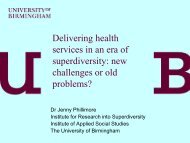
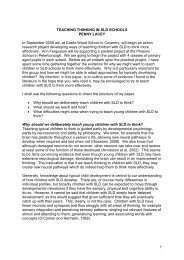
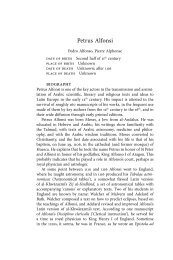
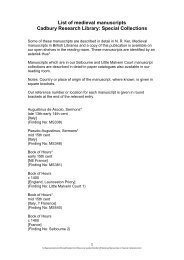
![Benyamin Asadipour-Farsani [EngD Conference abstract]](https://img.yumpu.com/51622940/1/184x260/benyamin-asadipour-farsani-engd-conference-abstract.jpg?quality=85)
